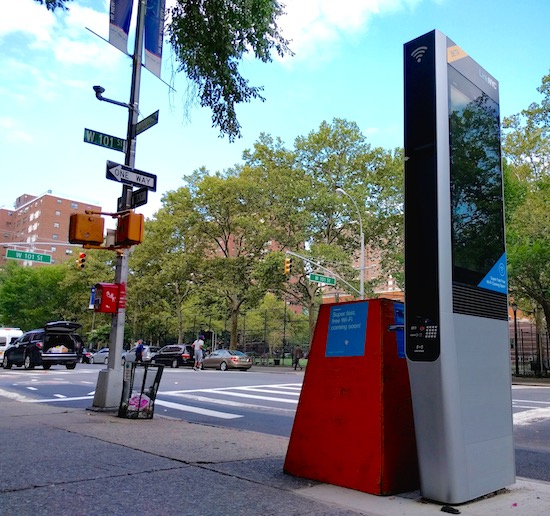
LinkNYC kiosk awaiting activation at 101st and Amsterdam.
By Joy Bergmann
When LinkNYC kiosks started being installed earlier this year, Mayor de Blasio and other officials touted how these “Public Communications Structures” would further the “goal of leveling the playing field and providing every New Yorker with access” to free, superfast Wi-Fi connections as well as free domestic telephone calls and device charging.
“The big goal is addressing digital inequality,” said project visionary Daniel Doctoroff, CEO of Sidewalk Labs, in an interview, estimating that three million New Yorkers do not have access to broadband. “Without fast access to the Internet, you cannot have equal opportunity.”
Some Upper West Siders, however, are wondering if the current sites of active Links match up with those stated intentions.
“The five kiosks in my area [67th and Broadway] are in front of higher-end buildings,” one woman wrote to WSR. “There are none in front of [NYCHA’s Amsterdam Houses] just a few blocks away. Seems like something is off about this.”
Here’s what WSR has learned.
Currently there are over 40 LinkNYC kiosks operating along Broadway between 110th Street and 66th Street. Each Link’s WiFi signal has a stated range of up to 150 feet (though some users say it can go farther). These Links could be considered as conveniently serving low-income UWS residents living in places like Euclid Hall [273 units at 86th and Broadway], The Marseilles [134 units at 103rd and Broadway] and Regent Family Residence [140 families at 104th and Broadway].
NYCHA residents living in Amsterdam Houses [Amsterdam Avenue between 61st and 66th, Wise Towers [90-91st Streets between Amsterdam and Columbus] and Frederick Douglass Houses [100-104th Streets and Amsterdam] do not yet have active Links on their blocks. LinkNYC says that situation will change, firstly along upper Amsterdam.
WSR spoke to residents about an erected, but not-yet-activated Link at 101st and Amsterdam, near the 830 Amsterdam NYCHA building. A mother and teenage daughter said they looked forward to the 9.5 feet-tall addition to their streetscape. “We already use the ones down on 96th,” said the mother. “We will definitely be using this one for charging and Wi-Fi. It’s great.”
A young man cast a more skeptical eye. “There’s nothing free in life,” he said, “You start using it, and liking it and what happens? Next thing you know, it’s five dollars. And that could be a hidden camera in there.”
Users are paying for the free service: with their eyeballs. Advertising revenue pays for the whole kit and caboodle. And as Daniel Doctoroff mentioned in that same interview, LinkNYC is a business venture: “We expect to make a lot of money from this.”
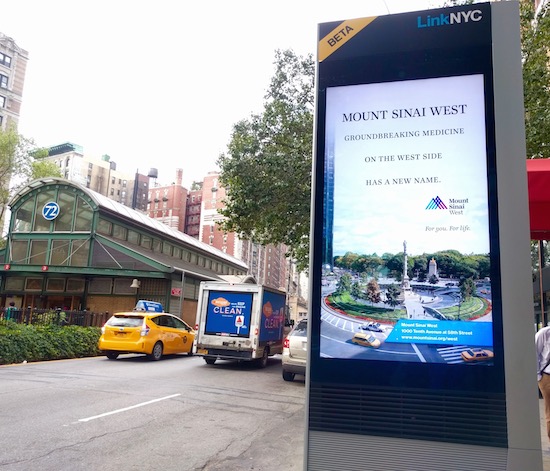
Link ads feature mix of local businesses like Mount Sinai and national brands like Delta and Samsung.
The program is a public-private partnership between the City’s Department of Information Technology & Telecommunications [DOITT] and CityBridge, LLC, a consortium including Intersection [comprised of Sidewalk Labs, an Alphabet (Google) company, and a merger between Control Group and Titan], Qualcomm and CIVIQ Smartscapes.
CityBridge won a 12-year franchise agreement with the City to install 7,500 LinkNYC kiosks across the five boroughs as a way to repurpose derelict pay phone infrastructure and benefit the public by providing free Internet access. The City will be paid no less than $500 million by CityBridge; CityBridge will also pay all costs related to the project, estimated at over $200 million, including building hundreds of miles of new, fiber-optic cable.
Which brings us back to the question of why the first round of UWS Links has clustered along Broadway.
A combination of factors, including density of pay phone sites and network installation feasibility, are key to siting the Links, a CityBridge spokesman told WSR. Every kiosk requires coordination with players including, but not limited to, ConEd, Verizon, DOT and the City.
As part of the agreement, CityBridge agreed to take on this existing infrastructure on an “as is” basis. And as with any major project, there are surprises lurking under the streets. Given the vagaries, CityBridge won’t commit to many firm installation dates.
They say Douglass Houses residents should expect nearby Links on Amsterdam to go live in the coming weeks. As for other NYCHA blocks, CityBridge said, “We don’t have an estimate,” but there will be “thousands more in Manhattan.” Multiple Links can and have appeared on a single block – for example Broadway between 72nd and 73rd – which is allowed so long as each Link is 50 feet away from the next.
Not everyone is thrilled. Preservation group Landmarks West! blasted the kiosks in testimony to the Landmarks Preservation Commission, “…the design of these structures is an unabashed billboard clogging increasingly cluttered streets.” LPC nevertheless approved the project.
A City spokesperson from DOITT urged UWS residents to keep an open mind, “Links are sleeker structures than the pay phones they replaced, leaving a smaller footprint [about a foot wide] on the neighborhood’s sidewalks. [They] will also attract consumers, helping drive local business.”



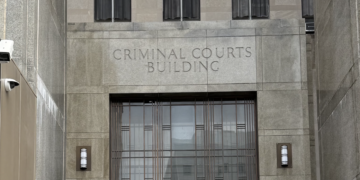
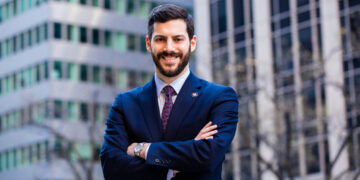

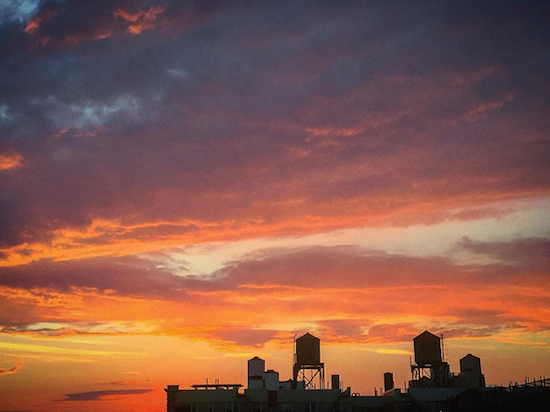


They are sleeker than and have a smaller footprint than the phone booths they replaced (which were also laden with advertising).
The speeds they deliver are, so far, superb … I have measured 100up/15down consistently. If you are lucky enough to have an apartment that can ‘see’ the station, the service works even 8 floors up. Personally, i’m not giving up my ISP but for those who cannot afford $40+/month for internet service, if they were rolled out at every intersection .. especially in places like Manhattan Valley … they would be transformative.
If there was a style that would not visually ruin the tree-lined character of our crosstown streets, even more people would benefit.
Phone booths had paper posters, not glaring digital billboards. Also there the ads are much much larger with the LinkNYC sites.
I think you mean 100down/15up speeds.
You are correct. Thanks for catching the error.
E
Who will clean them?
CityBridge has full responsibility for cleaning and maintaining the kiosks.
These beacons are nothing more than advertising beacons. They serve no purpose and nobody is using them. I have not seen a single person use them a single time. Why would they? There is no use for these things. This was just another advertising scam and sell out. Trace the money. This is crony capitalism. Someone has some connections here folks and literally put up advertising up and down our streets. I hate this city.
I have seen people actually using the beacon, literally using it. There is a little screen on the side that provides free Internat access. I once saw someone sitting on a bucket watching videos. I saw another person charging his phone and also using the screen….
When I was locked out of my apartment the other day I used the wifi (with my tablet) to send an email to work letting them know I’d be late. My phone was still in my apartment, so I was pretty grateful to have it.
It’s silly to say that you can’t see people using them when WiFi is invisible. I’m using them all the time but I’ve never walked up to one. I only wish they extended the Link wifi into the subway platforms, it works far better than the MTA’s.
That said, I have actually seen people physically use them. I’ve seen people watching videos and charging their phones at the actual kiosk.
Considering phone booths were not doing much for anyone I’d say the question is whether they are more valuable than nothing at all, and to me that is an easy answer.
I’ve seen people using the internet and charging phones too. And I have made calls from them — out of curiosity — and it works. Try it, it’s fun! It might cheer you up, GF.
You can see people using WiFi? I never knew that. If I am waiting for a bus I connect to it to save my data plan. And the Halal guy I order from is connected to it all the time he said…
On almost every phone with WiFi capability you can “see” networks within range, and also if they are locked or unlocked. Smart people and or whatever lock their network to prevent unauthorized use. However usually you can find one or two that haven’t in any given area. TWC users are usually good for a touch.
Starbucks is also a good “open” Wifi network you can usually see/find if you search via your phone. It explains why you often see persons camped out near or in front of those places even when they are closed.
@B.B of course you can see networks you can not see people who are using the networks…
“It explains why you often see persons camped out near or in front of those places even when they are closed.”
So you are saying that these are great then…People don’t need to camp out right in front of a closed Starbucks they can use these then
As for connecting to random open networks I would advise against it. That is one of the easiest ways to get hacked
” Not much different than cable theft back in the day” B.B.
…which was preceeded by telephone line theft, whic was preceeded by electricity line theft, which was preceeded by water line theft, which was…
Since many Starbucks locations are on the ground floor of residential buildings anything that reduces potential loitering is a good thing IMHO.
Will agree with you on using random open network connections; but plenty of people for various reasons do so all the time. Not much different than cable theft back in the day; if you cannot afford and or have your own, mooch off someone else’s I suppose the thought train goes.
“I hate this city.” – gf
I am sorry to hear you say that. Things do change, sometimes for the better, you know.
How would you “see” anyone use them. You realize they provide wireless connectivity, right? You don’t have to stand at the kiosk to use it.
Have you ever asked yourself what on earth the purpose of these ad beacons are? If people aren’t near the wifi station, then how are they using it, while they are walking? What happens when you near the end of the range? Does anyone here even realize what happens when your phone changes from one wifi station to another? It often coughs and loses all signal and isn’t seamless by any stretch. So no, I don’t think people are walking by using these worthless beacons, I think nobody is using them just like the poster suggested. In fact, I’m sure that nobody is using them because there is no practical use of them.
Why doesn’t a fan of these ad beacons give us all an example or two of their usefulness. Come on, give it a try. I’d love to hear it. Let’s start with “ok, you are walking down broadway, and …”.
Let’s face it, these things are just another example of a couple of friends taking care of a couple of friends. It’s called selling us out for money, the money of which we never see nor get a cut of. We get some crap all over our streets blaring out radiation and advertisements for us and our kids to see and some others get rich, much like the posters you see on the sides of bus areas, often advertising a nice dripping of blood from a knife advertising some horror movie or some such crap. Nice for our kids, right? Reminds me of the tv screens in the cab which block ones view of the road from the backseat (thanks Mikey Bloomberg!) which advertising and are almost impossible to shut off and the bikes we have with citibank advertised all over the city. Do you think that any of this sad nonsense happens in europe? They’d string up the guys who caused this in the street in public by the necks.
Reasons:
1. Filing for unemployment
2. Accessing public services
3. Looking up locations of shelters
4. Calling the police if you have been the victim of a crime
I’m glad you have a smart phone and can do all this sitting on the toilet, but many people do not.
@Sam “give us all an example or two of their usefulnes.”
1. Waiting for the bus and saving on my data plan
2. Street Vendors and workers in stores next to them having free WiFi.
3. Instead of people hanging out in Starbucks or infront of it, people can sit on benches outside and use them.
4. Free phone calls if your phone is dead
“they looked forward to the 9.5 feet-tall addition to their streetscape.”
Be careful what you wish for, makes street crossing more complicated due to line-of-sight obstruction.
I don’t have an issue with the concept or the design of the kiosks. However, as I walk around the neighborhood, it’s apparent to me how many are installed right in front of expensive apartment buildings where residents can well afford their own internet connections.
IIRC these kiosks replaced pay phones (remember those?), so don’t think there is anything elitist going on. Wireless isn’t entirely just that; somewhere or how you need to get into a network. In this case the City is taking away something hardly anyone used (pay phones) and using the wiring for these WiFi beacons.
The city of New York blithely sells out eyeballs and our “representatives” (I am talking to you Helen) do nothing.
I am confronted by electronic screens at work and on my home, yet that is my choice. I do want those giant LinkNYC billboards in my neighborhood. And I will never buy a product that uses them to advertise. It is just like sticking those video screens in our faces in cabs.
Re: The screens in cabs: They should at least compensate passengers who choose to view them, such as with a reduced fare. (The way Amazon offers a lower price on their devices if you agree to have ads displayed on it.)
“It is just like sticking those video screens in our faces in cabs.” SV
Agree. Worst is when you can’t get the screen to go off.
Gotcah, so all giant ads on the sides of buildings, bus stops, buses, inside cabs, on the subway stations, on the walls of the subway and pretty much everywhere else are fine, but these kiosks somehow cross the line for you?
You can ignore (or attempt anyway), and or turn down the volume for those taxi cab screens. That and you aren’t spending that much time in one anyway. OTOH try having one of these kiosks/beacons outside your apartment building.
The things are bright, quite bright and if you are on the ground to say a few floors up better get some thick window treatments.
Why is no one talking about the health dangers of Wi-Fi? What health impact studies were done by the city before these towers were turned on? From experience, I am sensitive to strong wi-fi signals (I start feeling very anxious) – I wonder how many of my fellow NY’ers feel the same way:
https://www.globalhealingcenter.com/natural-health/10-shocking-facts-health-dangers-wifi/
In my home, I have done my best to minimize wi-fi exposure – my desktop is hard wired and I do not have a cell phone.
I am starting petition to get these things removed!
The red eye on your TV is watching you.
Could it be…SATAN!!!
https://fellowshipofminds.files.wordpress.com/2014/11/could-it-be-satan.jpg
Completely agree. The human body is electromagnetic. More and more studies are coming out about the health effects of EMF. And the city of NY just added to the load with these “stations,” without any study on the health or other effects.
–In 2011 the World Health Organization stated that wireless technology is a Group 2B possible human carcinogen.
–The Bioinitiative report (Bioinitiative.org) documents the bioeffects of EMFs by reviewing more than 1800 medical and scientific studies. EMFs are absolutely problematic for human health, in particular childten because they “interfere with notmal body processes, prevent the body from healing danaged DNA, produce immune imbalances, and lower resileince to disease across multiple pathways.”
You could say we are inundated anyway, but we don’t know the strength of the signals these monoliths emit and the video displays themselves emit frequencies.
The Bioinitiative report is a classic case cherry picking data:
https://www.sciencebasedmedicine.org/picking-cherries-in-science-the-bio-initiative-report/
So far all the scientific peer reviewed studies for Wi-Fi radiation (which is ten times weaker than cell phone radiation) has proven to have no ill effect on the human body. Those who have claimed hypersensitivity to EMFs, when subjected to blind, controlled tests have been proven to not being able to “sense” the offending EMFs.
There are way to many cranks out there with three letters behind their names spreading juicy, eye catching misinformation. Pseudoscience at it’s worst.
Lol, please.
I notice that one is installed at 68th and Amsterdam. That is in front of a brand new apartment building that just opened and the restaurant/bakery on the bottom floor. So it is serving a building with people who can afford their own Internet and is on a street without a tremendous amount of foot traffic (compared to Broadway, Columbus or Amsterdam further north). I thought it was odd when I saw it.
I believe it is intended for use by pedestrians. Not people coming down from their brand new apartments or people interrupting their dinner out.
I wonder how much advertising revenue they’re bringing in. Lot of civic info, so far.
Related infrastructure question. What on earth is going on at the west corner of 80th and Broadway? Hugely disruptive. Where’s the public information? Extra entrances to the 79th Street subway are BADLY needed at this corner.
Good question, but seems a bit premature.
When would be a better time?
It’s great to have wifi for people who need it and don’t have access, but I have seen it other neighborhoods, not uws yet, where the homeless have just staked out claim to the kiosk and set up their bedrolls and belongings around them so they could use the charger and access the Internet. I’m not saying I don’t think the homeless have a right to the stations, but did anyone at all consider how this might become a problem for cleanliness, drug activity or fights over access?
Minor issues: I wanted to see what time it was one day and stopped at a kiosk but the time was not on it anywhere, I actually had to google what time is it. Might have been just my particular kiosk but, really, that seems so basic to me. Also, my home is close to one and I often get bumped out of my home wifi and asked to log into the free wifi which is very annoying, I’ve changed my settings several times only to be faced with it again every few weeks. Just annoying little things.
I’m so confused. Homeless people have cell phones? I know several seniors who have no landline or cells, so I’m curious as to how homeless people get cellphones (and a contract)?
You don’t need a contract to get a cell phone. All you need is cash and a Metro PCS store…just saying. The idea of homeless people having cell phones is not that far fetched.
Thank you Pedro, Jay and Zulu for the cell phone info. I’ll have to check into that and see what I can do about getting phones for some of the seniors in my building. 🙂
T-Mobile offers both prepaid and pay-as-you-go plans.
https://prepaid-phones.t-mobile.com/prepaid-plans
For those who just want a phone for talking and perhaps texting, pay as you go can work out quite well. You can refill/add value to the account several ways including buying cards at local stores.
They are provided by the government so that the homeless can have voicemail and call about jobs, presumably.
Rather than having a monthly or annual plan like most people who are likely reading this, poorer people use pay by the minute and prepaid plans and the like. It is a huge, very lucrative business for phone companies.
Phones, tablets, laptops, I and others have seen the homeless using all sorts of devices at these WiFi kiosks. I’m talking about those scruffy looking persons who look as if they haven’t been acquainted with soap and water much less a barber in a very long time. https://www.barstoolsports.com/newyork/people-are-actually-surprised-that-homeless-people-may-be-misusing-the-free-wi-fi-kiosks-in-manhattan/
This being said there are plenty of homeless who are just that, but not exactly destitute. Have seen more than a few neighborhood homeless persons in various bank branches at teller windows. This implies they must have some sort of account.
People get pensions, disability and other payments, but it can (and often is) not enough to rent or keep an apartment in NYC. Some beg/panhandle, collect recyclables, do odd labor jobs….
You also have a small subset of “transplants”; young persons who came to NYC or perhaps are even from the area that for various reason prefer to live on the streets. They get money from home or other sources. NYC has always been a beacon for young “runaways”, so you have that population as well.
I stopped reading the linked article whan I got to: “You bring anything new that draws a crowd in New York City and the homeless will be over that shit like stink on a homeless person white on rice.”
Yikes! who wrote such vile?
BB, thanks for the link! I had no idea this was going on, guess I’m not very observant or I don’t get out of my own neighborhood enough. The dancing part was sort of funny and a little SciFi-ish, lol. Someone referenced Minority Report earlier, but I immediately thought of the monolith in Space Odyssey when I saw the first kiosk go up.
Didn’t the device you used to google what time it is tell you what time it is?
Presumably, Ctp needed to set the time on the device or wanted to check its accuracy.
BTW, why do many stores, such as supermarkets, not have clocks (at least not conspicuously-placed ones)? My guess is that they want you to lose track of the time in the hopes of spending more time shopping and spending more.
Because everyone today walks around with a cell phone that has the time on it? Clocks and watches are becoming obsolete.
Why did the UWSer throw his/er clock out of the window?
Like the casinos in Los Vegas.
Re: “A young man cast a more skeptical eye. …And that could be a hidden camera in there.”
Probably, but do NOT worry !
As long as you wear your Tinfoil Hat you are SAFE from hidden cameras, AND from Black Helicopters as well.
they seem to be a hang out area for the homeless
Good. I see them use the one by me all the time and I think its great. They charge their devices and I see them use the free phone there too. Why not? If it helps some of them find a better life, then more power too them.
It won’t help everyone, so let’s not go there. Lets help those we can.
I have seen three people standing nearby using them: the coffee guy in front of Marshall’s on 78th taking a break, two guys plugged into one directly watching a soccer game, and a homeless guy watching porn.
you looked?
I usually simply read the grumpy NIMBY-centric comments on this site. Couldn’t keep quiet on this one, as my experience has been counter to so many of the posted complaints.
@gf and @sam, can’t tell if you’re trolling or just mostly wrong. Their purpose is very clearly stated above. I, for one, have used both actively and passively frequently for leisure and once so far for work, when I was on the go. It was faster than using my cell signal and didn’t use any of my cell data, which I pay for unlimited, but many are regularly gouged by the phone companies for incremental data.
The “blaring radiation” of the wifi you speak to is far less harmful than everyone using their own cell radios, which I assure you are constantly churning behind the scenes. @Downwithwifi, you can not own a cell and plug in your computer, but you’re still living in an apartment surrounded on as many as 6 sides, many times deep, with dozens of wifi devices connected to each other apartments. This is not to mention your neighbor’s microwave and portable phone use. One could avoid the signals by moving to a house upstate.
Using wifi also saves your phone battery. I’m sure tourists and those on the go will greatly appreciate the ability to charge a dying cell without having to return home or to the hotel.
Yes, I have also encountered issue of poor handoffs while walking in between or away, but this is minor to me. Plus you can always forget or turn off your wifi. I trust that with program this backed by companies at the forefront of wireless tech, like Qualcomm and Google, they’re both using the latest technology available and will likely enhance as time goes on. They’ll certainly have to if they want the city to renew the contract down the road.
As for the advertising, the above clearly states that the city will earn no less than $500 million from these and these are covering the $200 million+ of setup and maintenance costs. I’d far rather have these helpful devices than a tax increase.
“I’d far rather have these helpful devices than a tax increase.” Wrapguy
Was that the choice?
I did see/hear a young girl use the phone to call her Mom from outside Gristedes today, to make sure she was buying the correct item. I didn’t realize you could use it to make local calls!
Sounds like a moment that would have been good to capture in a photo. Did you snap one, by any chance? If so, send it to WSR and perhaps they’ll post it.
but you must have you own earbuds/headset…or you’re broadcasting!
Has anyone seen people bringing lawn chairs, blankets or the like to be within range of the signals?
See persons “camped out” in front of these kiosks all the time. Especially homeless persons.
Some homeless guy was sitting on something (couldn’t see what it was)on the corner of W57th and 8th a week or so ago; totally oblivious to those trying to get around as he was using the screen keyboard typing away.
Last Friday walking up 8th from 47th to 57th (to catch the M10), saw various persons ranging from homeless, tourists, to everyday persons using the kiosks.
I think these kiosks are great. I walked by one that flashed the latest Olympics score and I felt for a brief moment that it was scene from Minority Report.
In response to those who say no one is using them, I would dispute that as I have used them numerous times: to make free calls, to charge my phone, to get info. And I have seen many others using the kiosks. I’m not defending their existence, nor am I judging their moral value (or lack thereof) or anything else. Just saying that they are being used and those who claim otherwise are mistaken.
“Nobody goes there anymore. It’s too crowded.” – Yogi Berra
The Wifi kiosks were never intended to bridge the divide..that was just the smoke screen to give this marketing company unfettered, or at least virtually’ unfettered access to the public sidewalk for their massive advertising kiosks. And don’t forget these kiosks are also data mining so be careful about plugging in!
If they really wanted to bridge the divide these kiosks would have gone up first in underserved neighborhoods but they didn’t. They went up in the wealthiest areas on the UWS. There isn’t one corporate giveaway in this city that isn’t cloaked in some disingenuous claim that it’s all about helping poor people!
They are going up on the site of previous Verizon now Titian phone booths. Verizon if you recall reneged on it’s agreement with the city to provide free wifi and sold off the phone booths to Titian which used these as a means of providing advertising.
Now that Verizon just scooped up Yahoo, betcha they might regret not having kept their end of that deal. Think of the possibilities.
Verizon wishes to become a major player in content providing. Landlines and phone booths really don’t figure into that scenario.
Fight City Hall!
I just don’t like that they got a very lucrative contract on a very thin premise of providing a public service. The phone booth existed in a very different time.
The ones in our area are all around high end buildings where people don’t need free wifi and there is a library down the block for those who do. They are clearly targeting their placement for the ad buyers, not the needier folks. The bigger problem we have had is that the charging feature has been attracting vagrants who loiter at the kiosks.
Perhaps the machines directly in front of residences can just have ads (as much as I am opposed to the concept just trying to be realistic). No charging or phone function so that there is no loitering and the lights should be dimmed after a certain hour so that low apartments don’t have the light problem. There are going to be so many of these machines that I think this is a small concession on part of the LINK company.
Mins,
Most advertising contracts don’t provide ANY public service. This one does.
“The bigger problem we have had is that the charging feature has been attracting vagrants who loiter at the kiosks.” – Mins
Did you read the WSR MORNING BULLETIN? “A homeless man in his 30’s was found dead in Central Park near Central Park South and Seventh Avenue on Tuesday night.”
Now that’s a “bigger problem”.
Interesting as this conversation is; am almost certain if or when NYC has another major blackout like what happened 13 years ago (August 2003), those kiosks are going to be a hot property. Martial law may need to be imposed to provide access in a civil and safe manner.
Unless a battery backup is part of the kiosk it probably won’t have power during a blackout. The old landline phones were directly powered by the exchange. High voltage surges caused the phone to ring when a call was being received.
There are 5 phone booths on Broadway beteen 98 & 99. They’ll back up the 2 beacons on W 97.
don’t give up your phone line!
Too late for that in many instances.
Most young persons moving into our building only have a cell/smart phone. Those that do it is only because it came bundled with FIOS, Internet service and perhaps something else.
“Have “untimed” service which Verizon no longer offers,”
What is that, exactly? Doesn’t Verizon still offer unlimited residential calling plans?
With untimed service you pay per telephone call one flat rate (varies by day, night and weekend/holiday), regardless of how long.
https://groups.google.com/forum/#!msg/nyc.general/jzOtMA8qF5k/mEFLWzwLUYwJ
Have not looked recently to see if any other plans offered by Verizon are cheaper than what have now. Last time one did the only way to get cheaper phone service was to bundle things together.
Those “bundles” are a marketing scam. TWC Triple Play is an example of establishing a Single Point of Failure for all 3 services.
Have “untimed” service which Verizon no longer offers, nor will they allow me to switch back if I drop it for something else. So no, won’t be giving up my landline and cut the cord to cable years ago.
See how rotted and corroded the base of the red object (do not know what it is), next to the kiosk shown above? Give these things a year or so of dogs lifting their legs and the kiosks will suffer the same.
“the red object” is a Billboard FOR the Billboard!
It reads: Super Fast Free Wi-fi Coming Soon”, so I guess they wanted to use all of the beaacon space to generate advertising money.
I used the wifi from one of these just the other day when my son FaceTimed me while I was on the street and my cell reception was not good enough to make it work. I just wandered near a kiosk and called him back, and it was great.